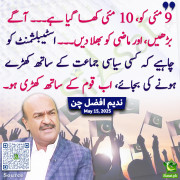Pakistani1947
Chief Minister (5k+ posts)
The Janzah prayer was performed over Imm Bukhr and his body was covered with soil. A beautiful musk smell exuded from the earth of his grave which lasted for several days. People from far and wide began to visit it in astonishment and also took handfuls of earth from his grave for blessings (tabarruk).
Abul-Fath as-Samarqand relates: "two hundred years after the death of Imm Bukhr, a drought struck Samarqand. The people made the istisq' prayer and invocations but rain did not fall. A saintly man came to the judge (Qd) of the city and gave him some advice. He said: 'With the people of the city, go to the grave of Imm Bukhr and invoke Allh the Exalted there to give you rain. Perhaps Allh will accept our invocations and give us rain.' The judge of the city accepted this advice with delight and proceeded to go to the grave. The people followed him and upon arrival, he prayed for rain in front of them at the grave. People wept and also sought the intercession of the one who was in the grave. At that moment, clouds gathered and Allh sent such heavy rain that those who were in Kharteng could not reach Samarqand for seven days because of the rain's abundance.
No doubt that Imam Bukhari was the compiler of the most authentic Hadeeths collected in Sahih Bukhari. But why we have to exaggerate his status by telling stories which are against the teaching of Quraan??? Imam Bukhari himself did not included any of the Hadeeth in his book, Sahih bukhari, proving intercession of a dead person in his grave. This concept of intercession is against Quraan:
[FONT=&]Allah says in the Holy Quran Chapter 2 Surah Al Baqarah verse 186:[/FONT]
وَإِذَا سَأَلَكَ عِبَادِي عَنِّي فَإِنِّي قَرِيبٌ ۖ أُجِيبُ دَعْوَةَ الدَّاعِ إِذَا دَعَانِ ۖ فَلْيَسْتَجِيبُوا لِي وَلْيُؤْمِنُوا بِي لَعَلَّهُمْ يَرْشُدُونَ
Translation by Shakir: And when My servants ask you concerning Me, then surely I am very near; I answer the prayer of the suppliant when he calls on Me, so they should answer My call and believe in Me that they may walk in the right way.
Translation by Pickthal: And when My servants question thee concerning Me, then surely I am nigh. I answer the prayer of the suppliant when he crieth unto Me. So let them hear My call and let them trust in Me, in order that they may be led aright.
Translation by Mohsin Khan: And when My slaves ask you (O Muhammad صلى الله عليه وسلم) concerning Me, then (answer them), I am indeed near (to them by My Knowledge). I respond to the invocations of the supplicant when he calls on Me (without any mediator or intercessor). So let them obey Me and believe in Me, so that they may be led aright.
اور جب آپ سےمیرے بندے میرے متعلق سوال کریں تو میں نزدیک ہوں دعاا کرنے والے کی دعا قبول کرتا ہوں جب وہ مجھے پکارتا ہے پھر چاہیئے کہ میرا حکم مانیں اور مجھ پر ایمان لائیں تاکہ وہ ہدایت پائیں
























